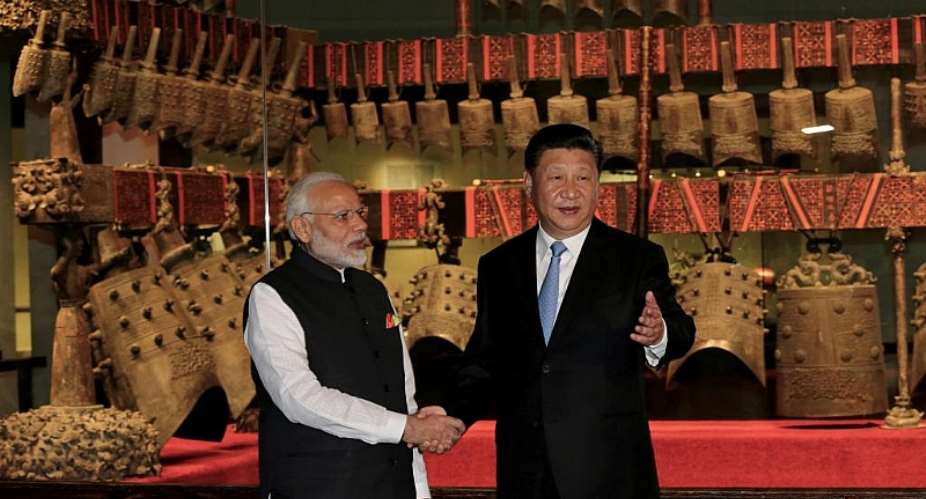Chinese President Xi Jinping and his Indian host Prime Minister Narendra Modi have pledged to cooperate against "radicalisation", but the two sides did not manage to solve the problems which keep them deeply divided.
The informal seaside meeting at Chennai in India on Friday was aimed at mending relations after India irritated China by its splitting of Jammu and Kashmir state in two in August.
The decision will also make the area's Ladakh region, which is partly claimed by China, a separate Indian administrative territory.
India in turn has been enraged by China's diplomatic backing of Pakistan, which controls a much larger part of the disputed Muslim-majority Kashmir region.
But at their talks, the leaders acknowledged a common challenge, Indian Foreign Secretary Vijay Gokhale said.
Dubbed the "2nd India-China Informal Summit" (after a similar summit in the Chinese city of Wuhan in April 2018) a statement by India's Ministry of External Affairs (MEA) talked about a "friendly atmosphere."
"Both leaders said that these were large countries and that radicalisation was a matter of concern to both, and that both would work together to see that radicalisation and terrorism did not affect the fabric of our multicultural, multi-ethnic, multi-religious societies", Gokhale told reporters.
India's Foreign ministry spokesman Raveesh Kumar called it "a highly productive day".
Legitimate rights
But the diplomatic niceties belie the underlying tensions. Part of Beijing's Belt and Road infrastructure mega-programme is planned in Pakistan-administered Kashmir, and Xi held talks with Prime Minister Imran Khan in Beijing just two days before meeting Modi.
When Xi said he supports Pakistan's "legitimate rights", India's MEA thundered it was "not for other countries to comment on the internal affairs of India."
For Beijing, Pakistan provides a crucial leg in its trillion-dollar Belt and Road Initiative, perceived by critics as a world-wide plan to extend China's soft power through construction projects.
China Pakistan Economic Corridor
Beijing is investing over 60 billion USD in the “China-Pakistan Economic Corridor” which goes through the part of Kashmir that is claimed by Pakistan.
This “corridor” extends from the Khunjirab pass between China and Pakistan, all the way to the Indian Ocean arriving at the newly-built, Chinese-financed port of Gwadar.
"The so-called 'China-Pakistan Economic Corridor' violates India's sovereignty and territorial integrity," India's MEA wrote earlier.
"No country can accept a project that ignores its core concerns on sovereignty and territorial integrity."
History of standoffs
Hostility between India and China goes back a long time. In 1962 they went to war and are engaged in periodic standoffs in the Himalayas since then.
To add insult to injury, Beijing's arch foe the Dalai Lama, spritual leader of the Tibetans who fled to India in 1959 after China took control of Tibetan lands, found refuge in the north Indian town of Dharamsala, which is also home to Tibet's government in exile.





 Akufo-Addo spotted ordering chiefs to stand for his handshake
Akufo-Addo spotted ordering chiefs to stand for his handshake
 Akufo-Addo ‘disrespects’ every chief in Ghana except Okyenhene — NDC Communicato...
Akufo-Addo ‘disrespects’ every chief in Ghana except Okyenhene — NDC Communicato...
 Supreme Court clears way for dual citizens to hold key public positions
Supreme Court clears way for dual citizens to hold key public positions
 Be transparent, don’t suppress the truth – Prof. Opoku-Agyemang to Jean Mensa
Be transparent, don’t suppress the truth – Prof. Opoku-Agyemang to Jean Mensa
 ‘I won’t tell the world I was only a driver’s mate during challenges’ – Prof Jan...
‘I won’t tell the world I was only a driver’s mate during challenges’ – Prof Jan...
 We’ll prosecute corrupt officials of Akufo-Addo’s govt – Prof Jane Naana
We’ll prosecute corrupt officials of Akufo-Addo’s govt – Prof Jane Naana
 [Full text] Acceptance speech by Prof Jane Naana Opoku-Agyemang as 2024 NDC Runn...
[Full text] Acceptance speech by Prof Jane Naana Opoku-Agyemang as 2024 NDC Runn...
 Election 2024: Don’t be complacent, we haven’t won yet – Asiedu Nketia cautions ...
Election 2024: Don’t be complacent, we haven’t won yet – Asiedu Nketia cautions ...
 Election 2024: Stop fighting over positions in Mahama’s next govt – Asiedu Nketi...
Election 2024: Stop fighting over positions in Mahama’s next govt – Asiedu Nketi...
 Prof Jane Naana Opoku-Agyemang will restore dignity of vice presidency – Fifi Kw...
Prof Jane Naana Opoku-Agyemang will restore dignity of vice presidency – Fifi Kw...
